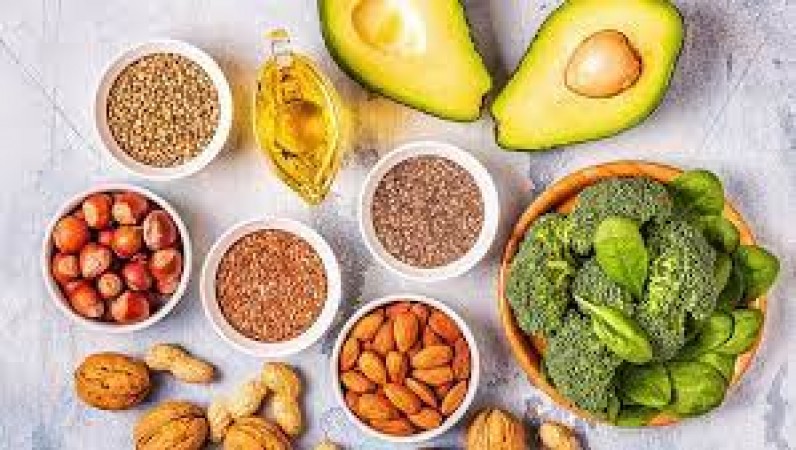
In today's health-conscious world, the benefits of omega-3 fatty acids are widely acknowledged. These essential fats play a crucial role in maintaining overall well-being, from supporting heart health to reducing inflammation. While many associate omega-3s with fish, vegetarians can also enjoy their benefits by incorporating the right plant-based foods into their diets. In this article, we will explore the best sources of omega-3 fatty acids for vegetarians, ensuring you get your daily dose of this vital nutrient.
Before diving into the vegetarian-friendly sources of omega-3s, let's briefly understand what these fatty acids are and why they are essential for our health.
Omega-3 fatty acids are polyunsaturated fats known for their numerous health benefits. There are three main types of omega-3s: alpha-linolenic acid (ALA), eicosapentaenoic acid (EPA), and docosahexaenoic acid (DHA). ALA is primarily found in plant-based sources, while EPA and DHA are commonly found in marine sources like fish.
Omega-3s are crucial for various bodily functions, including:
Heart Health: Omega-3s help reduce the risk of heart disease by lowering triglycerides, reducing blood pressure, and preventing the formation of blood clots.
Brain Health: DHA, in particular, is essential for brain development and cognitive function. It can improve memory and reduce the risk of cognitive decline.
Inflammation: Omega-3s have anti-inflammatory properties, which can help alleviate symptoms of inflammatory conditions like arthritis.
Eye Health: DHA is also found in the retina, making it beneficial for maintaining good vision and preventing eye diseases.
Now that we understand the importance of omega-3s, let's explore the best vegetarian-friendly sources to incorporate into your diet.
Flaxseeds are a nutritional powerhouse, boasting the highest ALA content among plant-based foods. Sprinkle ground flaxseeds on your cereal, yogurt, or smoothies for a daily omega-3 boost.
Chia seeds are another ALA-rich option. They absorb liquid and create a gel-like consistency, making them ideal for puddings, overnight oats, or as an egg substitute in baking.
Walnuts are not only a tasty snack but also a great source of ALA. They can be eaten on their own or added to salads, oatmeal, or baked goods for a nutty crunch.
Hemp seeds are loaded with ALA and provide a nutty flavor. Sprinkle them on salads, yogurt, or blend them into your smoothies.
For those who prefer a supplement, algal oil is an excellent source of DHA derived from algae. It's a suitable option for vegetarians and vegans.
Soybeans and soy products like tofu and tempeh contain ALA. Incorporate them into your meals to increase your omega-3 intake.
Edamame, young soybeans, are a delicious and nutritious snack that provides a good dose of ALA.
Even vegetables like Brussels sprouts contain ALA. Roast them for a crunchy side dish with added omega-3 benefits.
Leafy greens like spinach may not have as much ALA as other sources, but they can still contribute to your daily intake.
Pumpkin seeds, also known as pepitas, are a tasty ALA-rich snack when roasted and seasoned.
Seaweed, especially certain types like nori, contains DHA. It's a common ingredient in sushi and can also be used in salads and soups.
Switching to canola oil in your cooking can be a simple way to introduce more ALA into your diet.
Almonds are not only a healthy snack but also contain ALA. Enjoy them as a quick and satisfying source of omega-3s.
Avocado, known for its healthy fats, also contains some ALA. Spread avocado on toast or add it to your salads.
Olive oil is a staple in Mediterranean cuisine and contains ALA. Use it for salad dressings or drizzle it over cooked dishes.
Kidney beans, like other legumes, contain ALA. Incorporate them into soups, stews, and salads.
Cauliflower can be a versatile vegetable for your omega-3 needs. Roast it, mash it, or turn it into a delicious cauliflower rice.
Butternut squash is a tasty ALA-rich option for soups, roasted dishes, or as a side.
Among fruits, blackberries have a notable ALA content. Enjoy them fresh or add them to your morning smoothie.
Blueberries, a beloved superfood, also contain ALA. Incorporate them into your breakfast or snack on them throughout the day. As a vegetarian, you have a wide variety of omega-3-rich foods to choose from. By including these plant-based sources in your daily diet, you can enjoy the numerous health benefits associated with omega-3 fatty acids. Whether it's through seeds, nuts, vegetables, or supplements, prioritizing omega-3 intake is a step towards a healthier and more balanced lifestyle. So, don't hesitate to explore these delicious and nutritious options to meet your omega-3 needs. Your body and overall well-being will thank you.
Foods to Treat Fatty Liver Disease
7 Heart-Healthy Foods: Enjoy in Moderation for Optimal Health